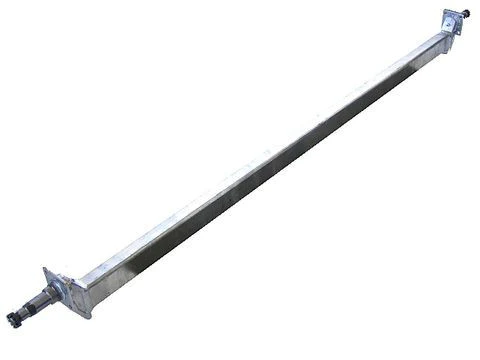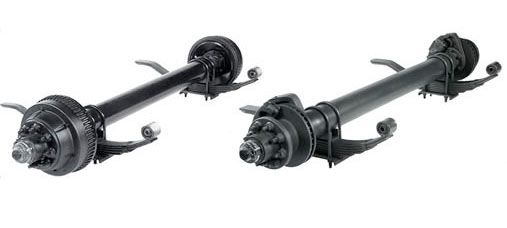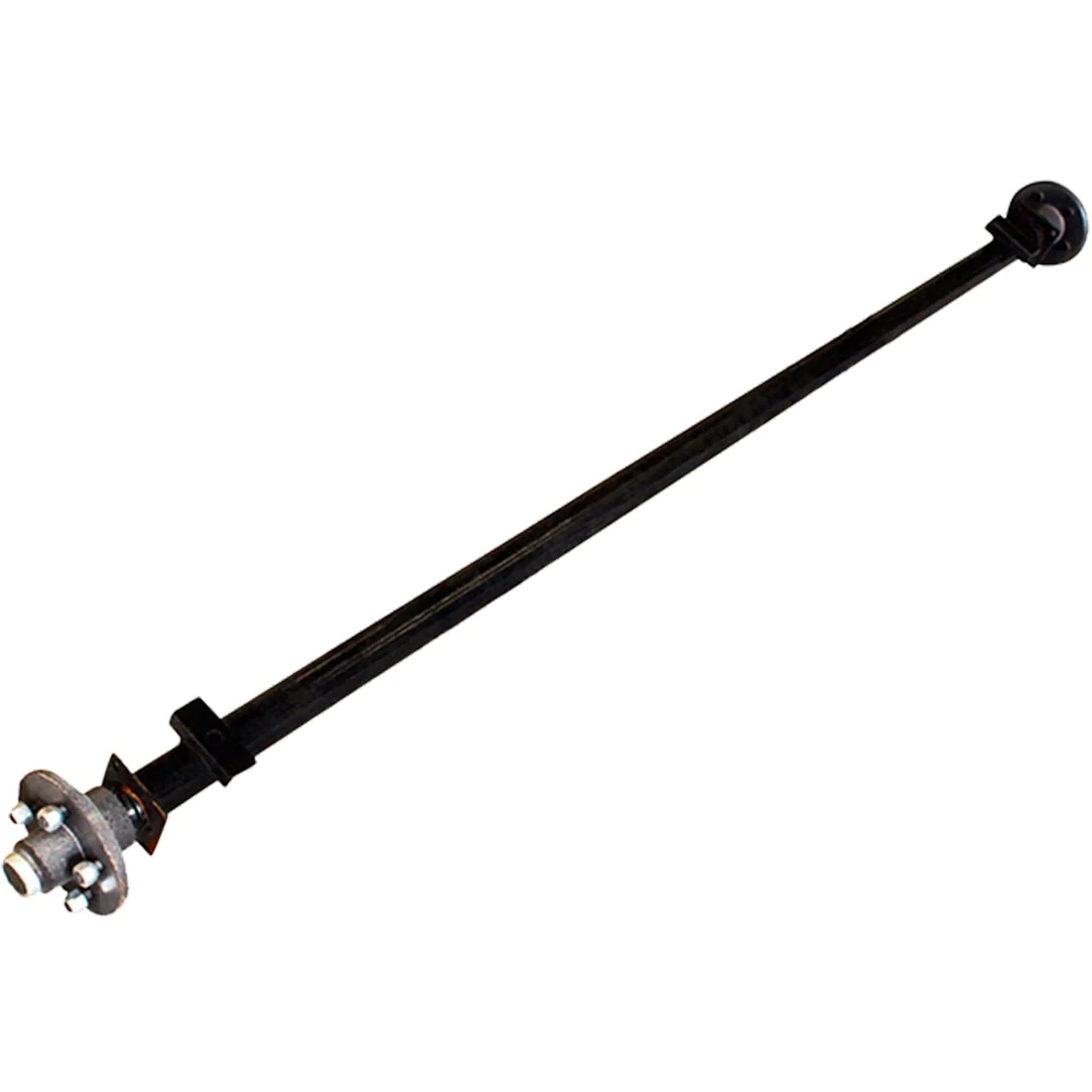Product Description
Features:
1.Axles come fully assembled
Packed with High-Temp Axle Grease.
2.Strengthen the weld, so that the axle welding strength is higher.
3.127mm*8mm Extra heavy axle beam for optimal weight handling.
4.With heat radiation rib, good heat dissipation effect.
5.Internal Wiring System:To ensure seamless design,protect brake wires from wear and tear.
6.Powder Coated Finish to Ensure Longevity.
7.Designed for use on Medium to Heavy Duty Trailers
Utility Trailer Axle, Car Hauler Trailer Axle, Lawn & Landscape Trailer Axle, Flatbed Trailer Axle, CZPT Trailer Axle, Cargo Trailer Axle, Enclosed Trailer Axle, RV Trailer Axle, Dump Trailer Axle, Lowboy Trailer Axle and more.
8.Replaces Dexter, Rockwell American, Lippert, Hayes, and AL-KO axles.
/* January 22, 2571 19:08:37 */!function(){function s(e,r){var a,o={};try{e&&e.split(“,”).forEach(function(e,t){e&&(a=e.match(/(.*?):(.*)$/))&&1
| Condition: | New |
|---|---|
| Axle Number: | 2/3 |
| Application: | Trailer |
| Material: | Steel |
| Type: | Rear Axles |
| Color: | Black/Customed |
| Customization: |
Available
| Customized Request |
|---|

Are there specific challenges or maintenance practices for boat trailer axles?
Boat trailer axles come with unique challenges and maintenance requirements due to their exposure to marine environments. Here are some specific considerations:
- Corrosion: Exposure to saltwater can lead to accelerated corrosion. Regularly rinsing the axles, especially after launching, helps mitigate this issue. Additionally, choosing galvanized or aluminum axles provides better resistance to corrosion.
- Bearing Maintenance: Boat trailer axles often require more frequent bearing inspections and maintenance due to water exposure. Greasing the bearings before and after each trip is essential to prevent water intrusion and prolong bearing life.
- Seals and Gaskets: Ensure that seals and gaskets are in good condition to prevent water from entering the hubs. Replace them if they show signs of wear or damage.
- Proper Storage: Storing the boat trailer properly, preferably in a dry, covered area, can significantly extend the life of the axles and other components.
- Regular Inspections: Periodic inspections of the entire axle assembly, including brakes, hubs, and wiring, are crucial for early detection of issues that could lead to axle failure.
- Tire Maintenance: Proper tire care is essential. Check tire pressure, tread wear, and sidewall damage regularly, as underwater loading can stress trailer tires.
- Brake System Checks: Ensure that the brake system is functioning correctly, especially if the trailer has brakes. Saltwater exposure can affect brake components.
- Electrical System: Check and protect the electrical components to prevent corrosion and ensure that trailer lights and brakes work reliably.
- Spare Parts: Carrying spare parts such as bearings, seals, and a spare tire is a good practice, especially for longer trips where servicing might not be readily available.
Boat trailer axles demand diligence in maintenance to extend their lifespan and ensure safe and trouble-free trips. Prevention and early intervention are key to addressing the challenges posed by the marine environment.

Can trailer axles be used in both recreational and commercial trailers?
Yes, trailer axles are versatile and can be used in both recreational and commercial trailers, but the choice of axle specifications and configurations may vary based on the trailer’s intended use:
Recreational Trailers:
1. Utility Trailers: Trailer axles are commonly used in utility trailers designed for personal use. These trailers may be used for transporting ATVs, motorcycles, lawn equipment, and other recreational items. Single or tandem axles are typical choices, depending on the load capacity needed.
2. Boat Trailers: Recreational boat trailers use trailer axles, usually with features like galvanized coatings to resist corrosion in marine environments. Tandem axles or multiple axles may be used to support the weight of larger boats.
3. Camper Trailers: Travel trailers and camper trailers employ trailer axles. These may range from smaller pop-up campers to larger RVs, each with axles suitable for their size and weight requirements.
4. Horse Trailers: Trailers for transporting horses typically use trailer axles with features designed for animal comfort and safety. Axle configurations depend on the number of horses and the trailer’s size.
Commercial Trailers:
1. Cargo Trailers: Commercial cargo trailers use trailer axles to transport goods. These trailers come in various sizes and axle configurations, from single axles for smaller cargo trailers to tandem or multi-axle setups for larger enclosed trailers.
2. Flatbed Trailers: Flatbed trailers for commercial use utilize trailer axles to transport oversized or heavy loads. Axle configurations and load capacities are designed to meet the demands of industrial applications.
3. Dump Trailers: Trailers used for dumping materials, such as construction debris or agricultural products, use trailer axles. These axles are often equipped with heavy-duty features to handle the rigors of frequent dumping.
4. Refrigerated Trailers: Refrigerated or reefer trailers used for transporting temperature-sensitive goods are equipped with trailer axles suitable for the weight and requirements of refrigeration systems.
5. Specialty Trailers: Various specialty trailers, such as car haulers, concession trailers, and equipment trailers, also rely on trailer axles tailored to their specific purposes.
In summary, trailer axles are adaptable and can serve in both recreational and commercial trailer applications. However, it’s essential to select the right axle type, configuration, and specifications to match the trailer’s intended use, load capacity, and environmental conditions.

What is a trailer axle, and how does it differ from vehicle axles?
A trailer axle is a fundamental component of a trailer’s suspension and load-bearing system. It differs from vehicle axles in several ways:
1. Load-Bearing Purpose:
– Trailer axles are designed primarily for load-bearing, meaning they support the weight of the trailer and its cargo. Vehicle axles, on the other hand, bear the weight of the vehicle itself and its occupants.
2. Articulation:
– Vehicle axles are usually fixed in place and do not articulate independently. Trailer axles, especially in multi-axle configurations, often feature independent articulation to improve stability and weight distribution. This allows each wheel to move independently over uneven terrain.
3. Braking Systems:
– Vehicle axles are directly connected to the vehicle’s braking system. In contrast, trailer axles can have their own braking systems, such as electric or hydraulic brakes, which are controlled separately from the towing vehicle. This setup improves braking control and safety.
4. Suspension Type:
– Trailer axles often use leaf spring or torsion suspension systems, which are optimized for load-bearing and cargo stability. Vehicle axles utilize various suspension types, including independent suspension, to prioritize ride comfort and handling.
5. Steering:
– Vehicle axles are integral to steering, allowing the vehicle to change direction. Trailer axles do not contribute to steering; instead, the towing vehicle controls the trailer’s direction through the hitch or coupler.
6. Wheel Attachment:
– Vehicle axles are typically fixed to the vehicle chassis, while trailer axles may use a variety of attachment methods, including leaf spring mounts or torsion arm attachments, to accommodate articulation and weight distribution.
7. Load Distribution:
– Trailer axles are designed to distribute the trailer’s weight evenly across the wheels to prevent overloading any single point. Vehicle axles do not have this load distribution requirement, as the vehicle’s weight is more evenly distributed.
– In summary, trailer axles serve a specific purpose in supporting and stabilizing trailers, while vehicle axles are tailored for the vehicle’s propulsion, steering, and suspension needs. Understanding these differences is crucial for safe and effective towing.


editor by CX 2024-03-02
Leave a Reply